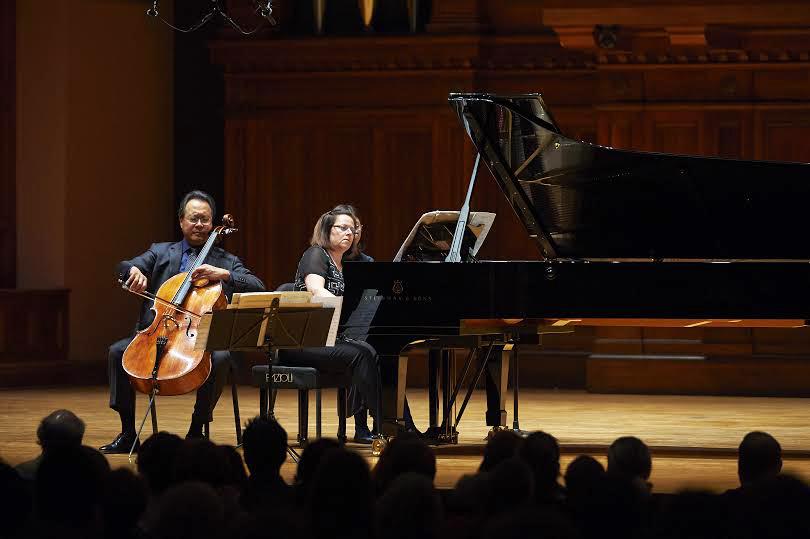Yo-Yo Ma Delivers Emotion, Intensity in Finney Chapel
Yo-Yo Ma hits a high note as Kathryn Stott accompanies him. Ma and Stott’s sold-out concert in Finney Chapel drew so many fans that overflow seating for a video live stream had to be made available in Warner Concert Hall — unprecedented for a classical concert at Oberlin.
December 6, 2013
For the second, and perhaps most anticipated, event in Oberlin’s 2013-14 Artist Recital Series, world-famous cellist Yo-Yo Ma, joined by pianist Kathryn Stott, played a brilliant concert on Nov. 20. The concert not only sold out Finney Chapel hours after it went on sale, but also nearly filled Warner Concert Hall, where a simulcast was streamed for those — including myself — who missed out on Finney tickets.
All evening Ma played with incredible emotion, throwing himself into the music. He was particularly stunning on Astor Piazzolla’s Oblivion, originally for bandoneon but arranged for cello and piano by Kyoko Yamamoto. With his trademark vivacity, Ma made his cello cry out in anguish. It felt as if by performing the piece, he was pouring out something deeply vital — something he must say. It was storytelling in its most artful form. Oblivion was performed as part of a seamless suite of pieces by South American composers that included Heitor Villa-Lobos’s Alma Brasileira and Camargo Guarnieri’s Dansa Negra, both arranged by Jorge Calandrell.
Ma was likewise totally absorbing on Igor Stravinsky’s Suite Italienne. He played with grace and vigor in the Introduzione, and in the lively parts of Aria he dug into the strings with spirit. Manuel de Falla’s 7 Canciones Populares Españolas was stellar. The first movement, “El Paño Moruno,” brimmed with Spanish flair; the last movement, “Polo,” showcased Ma’s astounding virtuosity with his bow and fingers. Stott was excellent on the piece as well, by turns playful, intense and deftly precise. The two performers have collaborated for nearly 30 years, and their chemistry was obvious. They were unfailingly in sync without even having to look at each other.
Always energetic in his playing, Ma didn’t quite capture simple beauty in some moments of the concert. In the Brahms Sonata No. 3 in D Minor for violin, his interpretation felt overbearing, especially in the Adagio movement. Conversely, in the melancholy second movement of de Falla’s piece, titled “Seguidilla Murciana,” his playing was a bit dry.
Olivier Messiaen’s Louange à l’Éternité de Jésus, the fifth movement — scored for cello and piano — from his famous Quatuor pour la fin du temps, left a little to be desired as well. The long, flowing melody was a bit disjointed at times, but there was no denying the passion Ma put into each note of this solemn yet intense work. A long pause followed as the performers remained still. Finally the applause came, a bit toned down compared to the rest of the evening — not for lack of appreciation, but in humble recognition of the power of Ma’s playing.
Three lovely encores followed: the charming Salut D’Amour by Edward Elgar; the fun, jamming Cristal by contemporary Brazilian composer Cesar Camargo Mariano; and the beautiful The Swan movement from Camille Saint-Saëns’s The Carnival of the Animals. Lighter in mood, pieces like these would have been appreciated earlier in the evening as well, but were nonetheless perfect as an ending.
Being at the simulcast in Warner rather than the live concert in Finney was a little disappointing but also interesting. The camera was zoomed in very close on Ma. One could see his closed eyes intently, see the quivering of his cello during moments of intense vibrato, see veins popping out in his hand, see his fingers moving with total conviction, each like its own being. One could also see him check a string for pitch before playing, hear a page turn very loudly and, in one camerawork mishap, get a very awkward, up-close view of the page-turner’s butt. Applause was also a bit half-hearted, as the Warner audience realized that any show of appreciation would go unnoticed by Ma. Not that he would care, probably; he was deep in the moment in Finney with the live audience’s wild clapping and stomping booming through the simulcast.



















